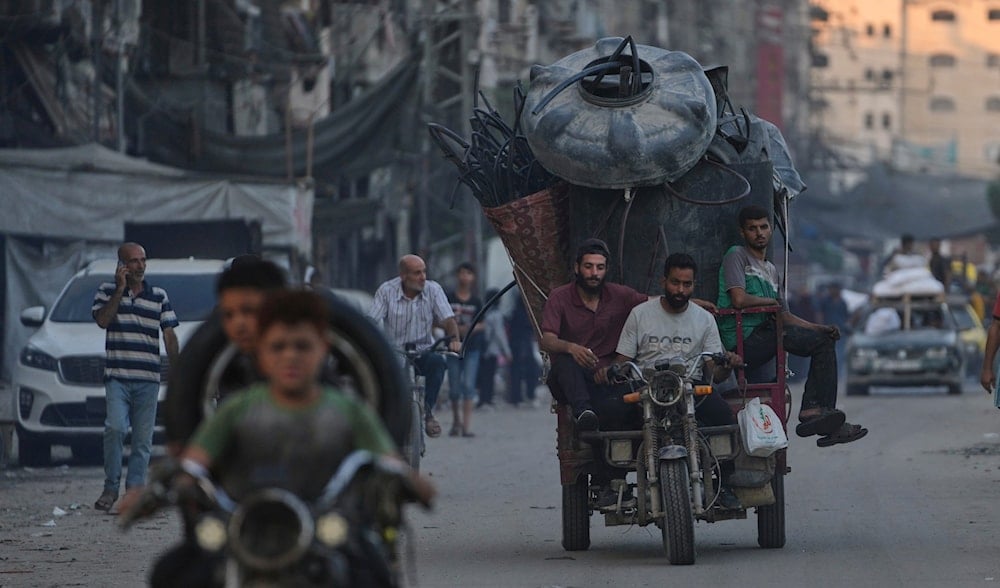'Israel' ends aid pauses in Gaza City, exacerbating famine
"Israel" halts aid pauses in Gaza City, escalating attacks, as famine worsens and Palestinians face hunger, disease, and forced displacement.
-

Displaced Palestinians fleeing the northern Gaza Strip move with their belongings on a street in Gaza City, Friday, Aug 29, 2025 (AP)
"Israel’s" military has declared it will no longer pause fighting to allow aid convoys into Gaza City, a move expected to intensify the famine already devastating the northern part of the Strip.
The decision comes as Israeli forces escalate attacks in and around Gaza City ahead of a ground offensive that humanitarian groups and even close allies of "Israel" have warned could be catastrophic, as Palestinian civilians are already struggling with hunger, disease, and daily Israeli bombardment.
Rising famine-related casualties
Gaza’s Health Ministry reported on August 29 that five people died of malnutrition in 24 hours, bringing the total number of famine-related deaths to 322. The Ministry warned that conditions are rapidly worsening, particularly in the north, where food shortages are most severe.
The occupation military announced that Gaza City is now a “dangerous combat zone,” ending the previous limited local pauses that allowed limited aid convoys. No evacuation order was issued, even though around 80% of the Gaza Strip is under evacuation notices, leaving civilians crammed into a fifth of the territory. Many so-called “humanitarian zones” have repeatedly come under attack, including the vicinity of hospitals and areas that house refugee tents.
Escalation before a new offensive
In recent days, Israeli tanks have entered Gaza City’s outskirts, and entire neighborhoods, such as al-Zaytoun, have been leveled.
Military spokespersons described the current escalation as the “initial stages” of a planned Gaza City operation. Some reports suggest senior commanders are at odds with Israeli Prime Minister Benjamin Netanyahu over whether the army has the capacity to carry out his orders after nearly two years of war.
Despite international pressure, "Israel" has refused to engage with the latest ceasefire proposal reportedly accepted by Hamas. Even though polls show that most Israelis support ending the war in exchange for the release of captives, Netanyahu’s far-right coalition partners have threatened to collapse the government if fighting stops.
Humanitarian collapse
The UN estimates that 23,000 Palestinians have fled Gaza City in the past week alone, while many remain trapped. Severe hunger, lack of transport, and the risk of being targeted en route have made displacement nearly impossible for thousands.
Aid organizations said they were not informed in advance of Friday’s announcement, and Gaza’s Health Ministry warned it cannot serve the entire displaced population if forced south. Churches in Gaza City also vowed not to evacuate, saying that fleeing would be a “death sentence” for the weak and malnourished taking shelter there.
Additionally, European states, including Ireland, Spain, and Norway, condemned the new offensive and warned against any permanent "Israeli" military presence in Gaza.
Strains within the military
Reports from Israeli media reveal the army is struggling to mobilize manpower. Training time for new reservists has been cut in half, raising concerns among senior officers about readiness for the Gaza City assault. Meanwhile, legal authorities are debating whether the government can detain draft evaders at border crossings.
Despite domestic criticism, international outrage, and warnings of famine, Israeli officials remain committed to expanding military operations. US envoy Steve Witkoff suggested the war may continue until the end of the year, far beyond the timeline of the Gaza City offensive.

 3 Min Read
3 Min Read








